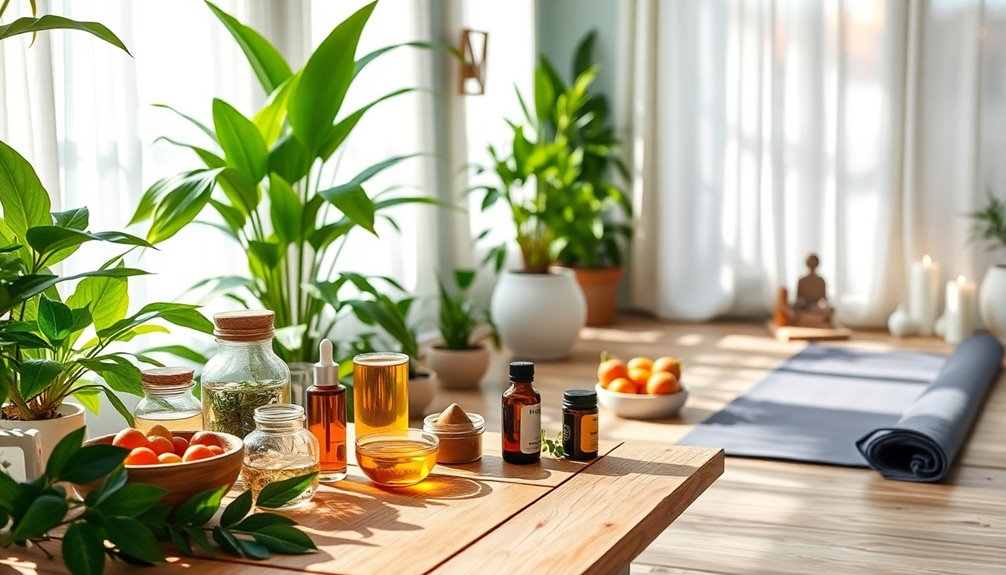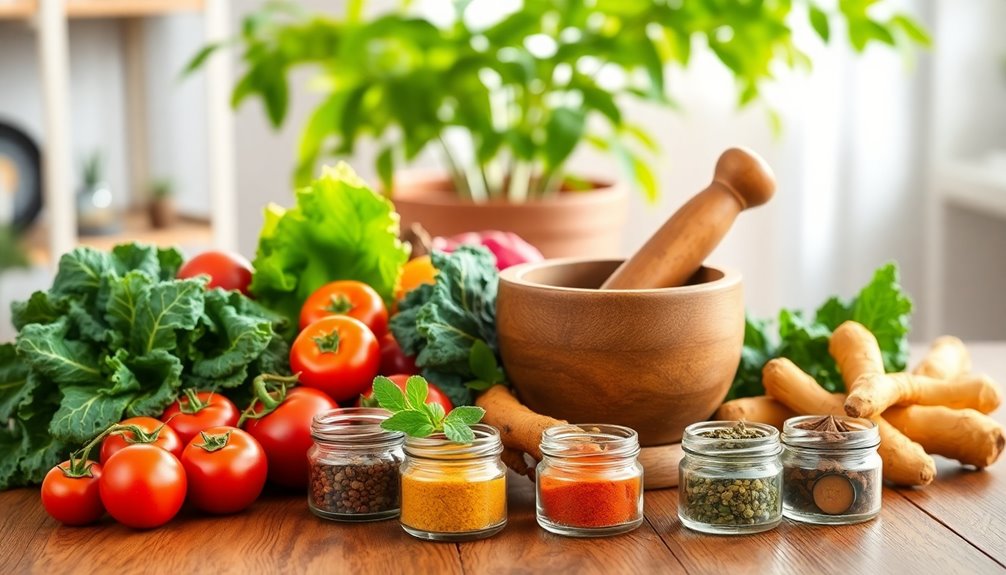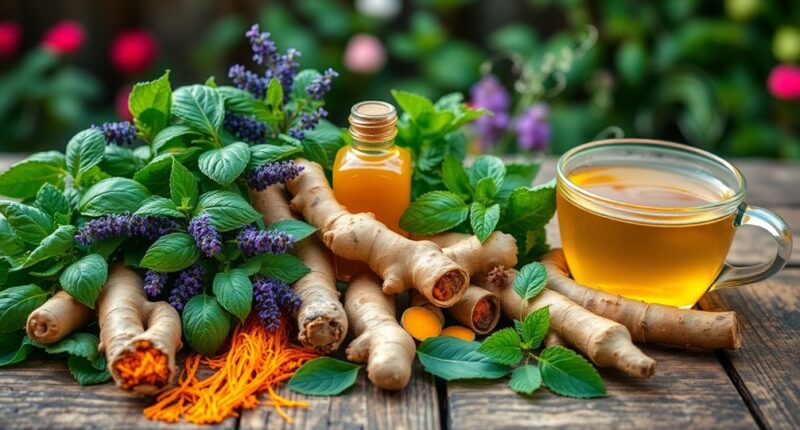Holistic health remedies focus on enhancing your overall well-being by connecting physical, emotional, mental, and spiritual aspects. These remedies include herbal medicine, acupuncture, and mind-body practices like yoga and meditation. Nutrition plays an essential role, as whole foods and proper hydration support your body's healing processes. You can effectively combine holistic remedies with conventional care for improved health outcomes. Discovering the variety of practices available can empower your personal wellness journey. There's so much more to explore!
Key Takeaways
- Holistic health remedies emphasize treating the whole person, integrating physical, emotional, mental, and spiritual well-being.
- Common practices include herbal medicine, aromatherapy, acupuncture, yoga, and massage therapy for relaxation and healing.
- Nutrition and hydration play crucial roles in supporting immune function and overall well-being through whole foods and proper water intake.
- Mind-body techniques like meditation and yoga foster emotional balance and stress reduction, enhancing mental health.
- Holistic approaches can complement conventional care, improving health outcomes and promoting self-responsibility in wellness journeys.
Understanding Holistic Health Remedies

When you explore holistic health remedies, you'll find a diverse range of practices aimed at enhancing your overall well-being.
Holistic health recognizes that physical, emotional, mental, and spiritual aspects are interconnected. By addressing imbalances, you can achieve peak health.
Herbal medicine plays an essential role, using plant-based treatments like echinacea and ginseng to alleviate symptoms and promote wellness.
Aromatherapy, with essential oils derived from plants, helps with stress reduction and relaxation.
Techniques such as yoga and meditation are integral to these remedies, focusing on the mind-body connection and fostering emotional balance.
The Importance of Holistic Approaches

Recognizing the interconnectedness of your physical, emotional, mental, and spiritual health is essential for achieving overall well-being. A holistic approach prioritizes treating the whole person, aiming for balance and integration of various therapies.
By focusing on underlying causes rather than just alleviating symptoms, you can experience more sustainable health improvements and better patient care outcomes. Holistic health remedies empower you to take an active role in your wellness journey, promoting self-responsibility and lifestyle changes.
Incorporating both conventional and alternative therapies allows for a thorough, individualized approach to integrative healthcare. Furthermore, emphasizing prevention and self-care in holistic practices can greatly reduce the risk of chronic illnesses and enhance your overall health and wellness, demonstrating the importance of a balanced approach. Utilizing essential oils, such as eucalyptus oil, can significantly support respiratory health and alleviate various ailments.
Common Types of Holistic Remedies

Holistic remedies offer a diverse range of options to enhance your well-being, each targeting different aspects of health.
You can explore various holistic practices like acupuncture, which uses needle insertion to balance your energy flow and relieve pain.
Yoga combines physical postures and meditation, improving your mind-body connection while reducing stress.
Massage therapy manipulates your muscles and soft tissues, promoting relaxation and circulation.
Aromatherapy employs essential oils, such as lavender or peppermint, to uplift your mood and support emotional wellness. Essential oils for aromatherapy can also provide therapeutic benefits like improved sleep quality and enhanced focus.
Additionally, herbal remedies harness the power of plants to boost your immune system or energy levels.
Herbal Medicine: Nature's Pharmacy

When you explore herbal medicine, you're tapping into nature's pharmacy for health and healing.
You'll find popular remedies that can support everything from your immune system to your mood. Turmeric's anti-inflammatory properties make it a valuable addition to your wellness routine.
Just remember to follow safe usage guidelines to make the most of these powerful plants.
Healing Properties of Herbs
Herbs have long been celebrated for their healing properties, offering a natural way to enhance your well-being. In the domain of holistic health, herbal treatments utilize plant-based remedies like teas, capsules, and tinctures to address various ailments.
For instance, echinacea is well-known for its immune-boosting effects, while ginseng can help you combat fatigue and boost energy levels. Garlic supports cardiovascular health by lowering blood pressure and cholesterol, promoting a healthier heart.
If you're seeking relaxation, valerian root provides sedative effects that can improve sleep quality and ease anxiety.
Popular Herbal Remedies
Exploring the world of herbal remedies can open up a treasure trove of natural treatments that enhance your health. Herbal medicine emphasizes the use of plant-based treatments, providing holistic health benefits without pharmaceuticals. Popular remedies like St. John's Wort can help manage anxiety and mild depression, while echinacea boosts your immune system. Ginseng offers energy and stress relief, and garlic supports heart health by lowering cholesterol levels.
| Herb | Benefits | Usage |
|---|---|---|
| St. John's Wort | Antidepressant effects | Teas, capsules |
| Echinacea | Immune system booster | Tinctures, extracts |
| Ginseng | Energy boost | Teas, capsules |
| Garlic | Cardiovascular support | Raw, supplements |
| Turmeric | Anti-inflammatory properties | Powders, capsules |
Personalized approaches make these natural remedies effective for various conditions.
Safe Usage Guidelines
While natural remedies can offer numerous health benefits, it's crucial to use them safely. Here are some safe usage guidelines for herbal medicines:
- Always consult a qualified healthcare professional before starting any herbal remedies.
- Choose products from reputable sources to guarantee quality and purity.
- Follow dosage instructions precisely; more isn't always better.
- Be aware of potential side effects and allergic reactions, and discontinue use if adverse effects occur.
If you're pregnant or breastfeeding, consult your healthcare provider before using any herbal medicines, as some may pose risks.
Acupuncture: Restoring Energy Balance

Acupuncture helps you regulate your body's energy flow, also known as Qi, which is essential for maintaining balance and health.
By targeting specific points, it can effectively relieve pain and promote overall well-being.
If you're looking for a natural approach to enhance your wellness, acupuncture may be worth exploring.
Energy Flow Regulation
Energy flow regulation is essential for maintaining overall health, and acupuncture serves as a powerful tool in achieving this balance.
This traditional Chinese medicine technique targets blockages in your energy flow, or Qi, restoring harmony within your body. By reestablishing this balance, you can experience improvements in various health conditions.
Benefits of acupuncture include:
- Enhanced energy levels
- Reduced stress and anxiety
- Relief from chronic pain
- Improved digestion
Acupuncture sessions typically last between 30 to 60 minutes and are tailored to your unique health needs.
With recognition from the World Health Organization, acupuncture is increasingly integrated into holistic health practices, making it a viable option for those seeking to enhance their well-being through energy flow regulation.
Pain Relief Techniques
When it comes to pain relief, acupuncture stands out as a time-tested method that effectively restores balance and promotes healing in your body. This holistic therapy involves inserting thin needles at specific points to stimulate the flow of Qi, your body's essential energy.
Research shows acupuncture can relieve various pain conditions, including chronic issues like migraines and lower back pain. By activating your natural painkillers, this practice enhances your nervous system's overall functioning.
Each session typically lasts 30 to 60 minutes, leaving you feeling relaxed and rejuvenated. The World Health Organization recognizes acupuncture as a valid treatment option, solidifying its role in complementary therapies and natural healthcare.
Embracing acupuncture might be the solution you need for effective pain relief.
Aromatherapy: The Power of Scents

Aromatherapy harnesses the power of scents to promote well-being, making it a popular choice for those seeking natural remedies. By using essential oils extracted from plants, you can enhance your physical and emotional well-being.
Here are some key benefits:
- Lavender oil for relaxation and stress reduction
- Peppermint and eucalyptus for cognitive performance and respiratory support
- Versatile applications through inhalation, topical use, or diffusers
- Enhanced effects when combined with other holistic therapies like massage
However, be mindful of safety concerns, such as potential allergic reactions and skin sensitivities. Additionally, regular use of essential oils can create a positive environment, reducing stress and enhancing emotional well-being.
Always verify proper dilution and source high-quality essential oils to experience the full benefits of aromatherapy safely and effectively.
Mind-Body Practices for Wellness

How can integrating mind-body practices into your routine transform your overall wellness? These practices, like yoga and tai chi, blend movement, breath control, and mindfulness, helping you reduce stress and enhance emotional well-being.
Meditation serves as a powerful tool, lowering blood pressure and boosting focus, which can greatly support your mental health. Techniques such as biofeedback allow you to gain awareness over physiological functions, effectively managing chronic pain and anxiety.
Additionally, guided imagery promotes relaxation, reducing stress levels and aiding health recovery. Mindfulness-based stress reduction (MBSR) programs have proven effective in alleviating symptoms of anxiety, depression, and chronic pain, fostering a greater awareness of the present moment.
Embrace these practices for a holistic approach to your wellness journey.
Nutrition's Role in Holistic Healing

Nutrition's a cornerstone of holistic healing, and embracing whole foods can greatly boost your well-being.
By maintaining a balanced diet and staying properly hydrated, you support your body's natural healing processes and overall health. A raw food diet, which emphasizes unprocessed, uncooked foods, can enhance nutrient retention and improve energy levels.
Let's explore how these factors play an essential role in your journey to wellness.
Whole Foods Benefits
When you incorporate whole foods into your diet, you're not just eating healthier; you're also embracing a holistic approach to well-being.
Whole foods, like fruits, vegetables, whole grains, nuts, and seeds, offer numerous benefits that enhance your health and mental health.
Here are some key advantages:
- Rich in essential nutrients and antioxidants
- Promote gut health and a stronger immune system
- Lower glycemic index helps regulate blood sugar levels
- Linked to reduced symptoms of depression and anxiety
- Chia seeds are a great example of a whole food that provides high fiber content, supporting digestive health and overall wellness.
Balanced Diet Importance
A balanced diet is essential for your body's healing and overall well-being, as it provides the important nutrients needed for ideal function.
Focusing on whole foods, especially plant-based foods, can greatly enhance your health and well-being. Studies show that such diets can reduce the risk of chronic diseases like heart disease and diabetes by up to 30%.
Nutritional deficiencies can hinder your immune function and healing, so ensuring adequate vitamin intake is critical. Incorporating mindful eating practices helps you connect with your body's hunger cues, improving digestion and emotional wellness. Additionally, apple cider vinegar may aid in appetite suppression, further supporting your weight loss efforts.
Hydration and Healing
While a balanced diet lays the foundation for your health, hydration plays a key role in your body's healing process.
Ideal hydration supports various functions vital for holistic healing practices. Here's why staying hydrated is essential:
- It enhances nutrient transportation and waste removal.
- Proper hydration strengthens your immune system and reduces inflammation.
- Drinking adequate water aids in detoxification and promotes skin health.
- Herbal teas and broths offer hydration along with beneficial nutrients and antioxidants.
- Additionally, improved air quality from air purifiers can further support overall well-being by reducing allergens and respiratory issues.
Integrating Holistic Remedies With Conventional Care

Integrating holistic remedies with conventional care can greatly enhance your overall treatment experience. By adopting an integrative approach, you can address both physical symptoms and emotional well-being, leading to improved patient outcomes. Collaborating with holistic practitioners alongside your healthcare providers allows you to create a thorough treatment plan that includes lifestyle changes and complementary therapies.
| Holistic Approach | Conventional Treatment | Benefits |
|---|---|---|
| Nutritional Counseling | Medication | Improved well-being |
| Acupuncture | Physical Therapy | Reduced symptoms |
| Stress Management | Surgery | Enhanced recovery |
Many hospitals now recognize the value of holistic care, offering complementary therapies as part of their patient programs. This combination can make conventional treatments more tolerable and effective.
Finding the Right Holistic Practitioner

How do you find the right holistic practitioner to support your health journey? Start by exploring the American Holistic Health Association's online provider search to connect with qualified professionals in your area.
Here are a few tips to guide you:
- Seek recommendations from trusted friends, family, or health organizations.
- Investigate the practitioner's training, experience, and board certification.
- Confirm they understand your individual health needs and are willing to listen.
- Establish a comfortable and respectful provider-patient relationship.
Finding a holistic practitioner who meets your needs is essential for effective treatment.
Frequently Asked Questions
What Are Holistic Remedies?
Holistic remedies focus on treating the whole person—mind, body, and spirit—rather than just symptoms.
You might explore practices like herbal medicine, where you use plant-based treatments for wellness.
Acupuncture could help relieve pain and stress through energy flow stimulation.
Aromatherapy involves using essential oils to promote relaxation, while yoga combines physical movement and meditation to enhance overall well-being.
Embracing these approaches can lead you to a more balanced and healthier life.
What Are the Five Areas of Holistic Health?
Have you ever considered how interconnected your well-being really is? The five areas of holistic health are physical, emotional, mental, social, and spiritual health. Each aspect plays an essential role in your overall wellness.
By maintaining a balanced diet and exercising, you support your physical health. Managing your emotions builds resilience, while mental health practices like mindfulness enhance clarity.
Strong social connections enrich your life, and nurturing your spiritual side brings deeper meaning.
What Are Some Holistic Health Practices?
When exploring holistic health practices, you'll find a variety of approaches that promote well-being.
You might try acupuncture to relieve pain and reduce stress, or enjoy the soothing effects of aromatherapy with essential oils like lavender.
Engaging in yoga or meditation can strengthen your mind-body connection, while herbal remedies like echinacea can support your immune system.
Finally, adopting healthier eating habits and regular exercise will enhance your overall lifestyle and vitality.
What Are the 8 Natural Remedies?
You might think natural remedies are just a fad, but they've been around longer than your favorite TV show.
To explore eight effective options, consider herbal remedies like echinacea, essential oils for aromatherapy, acupuncture for pain relief, and mindfulness meditation to clear your mind.
Don't forget dietary changes, homeopathy, probiotics for gut health, and even yoga for flexibility.
Each one offers a unique way to enhance your well-being—who knew nature had so much to offer?
Conclusion
Incorporating holistic health remedies into your life is like tending to a garden. Just as each plant needs specific care to thrive, your body and mind require a blend of practices—like herbal medicine, acupuncture, and nutrition—to flourish. Imagine nurturing your well-being with the same dedication you'd give to your favorite flowers. By embracing these approaches, you'll cultivate a healthier, more balanced life, allowing you to bloom in ways you never thought possible.









